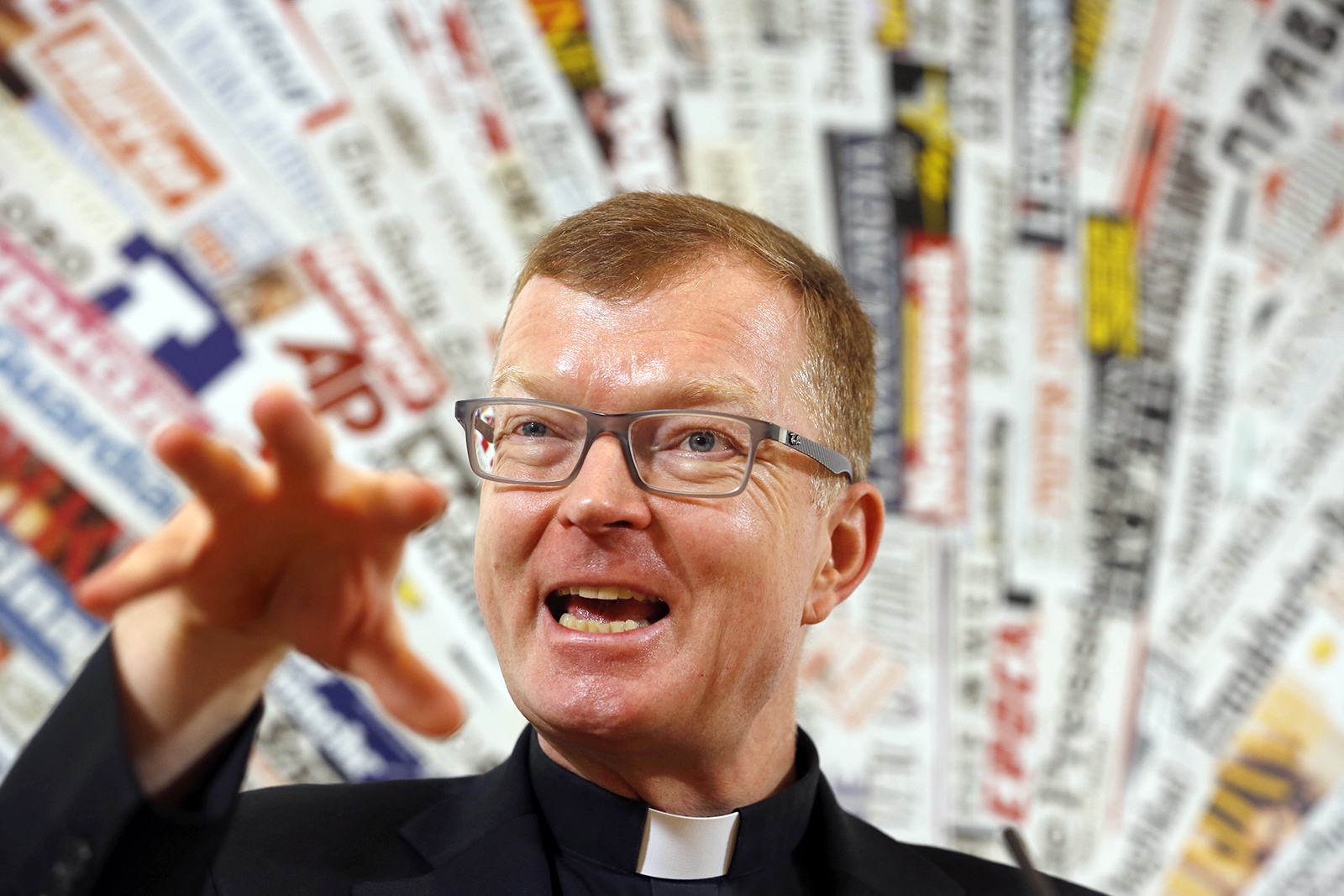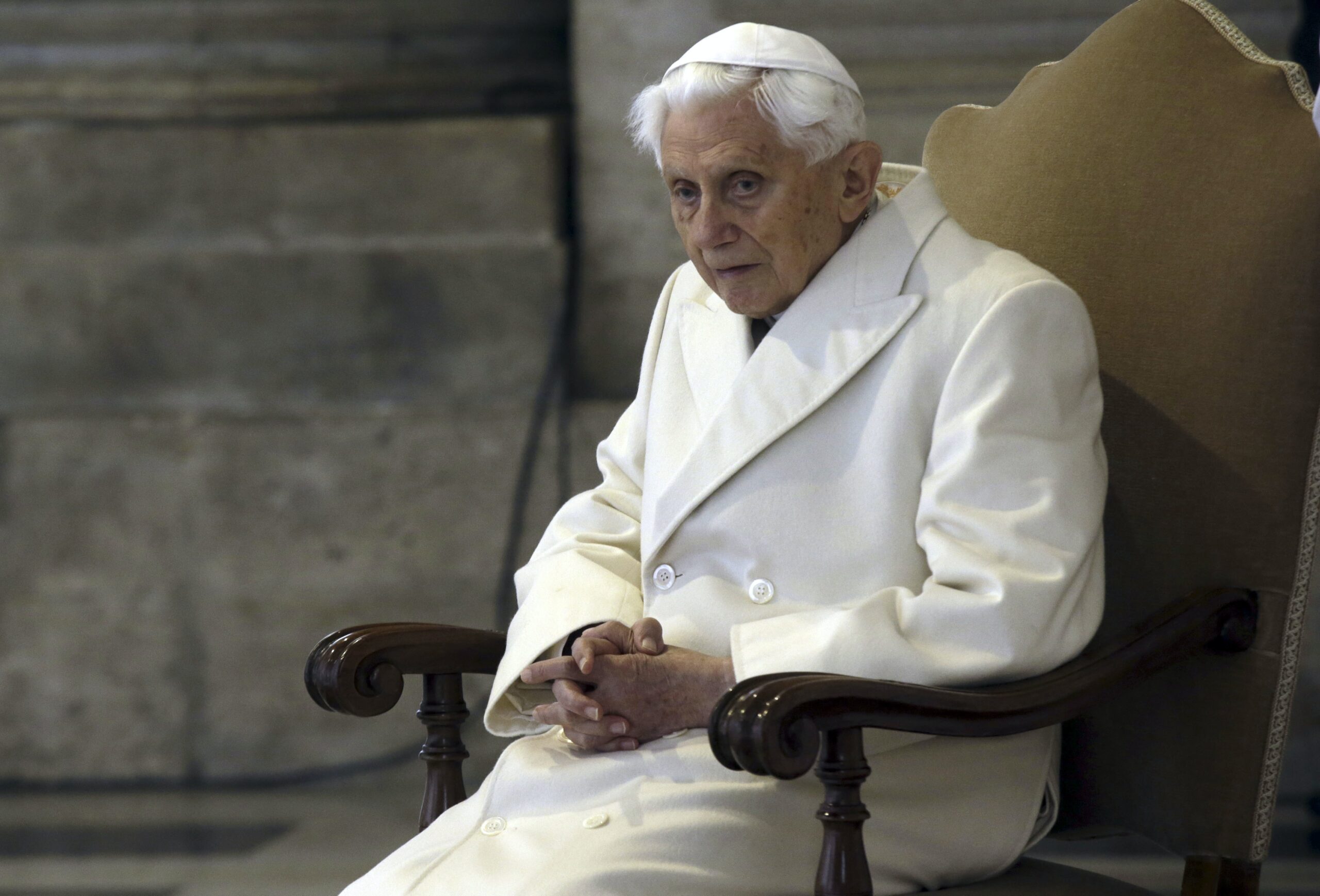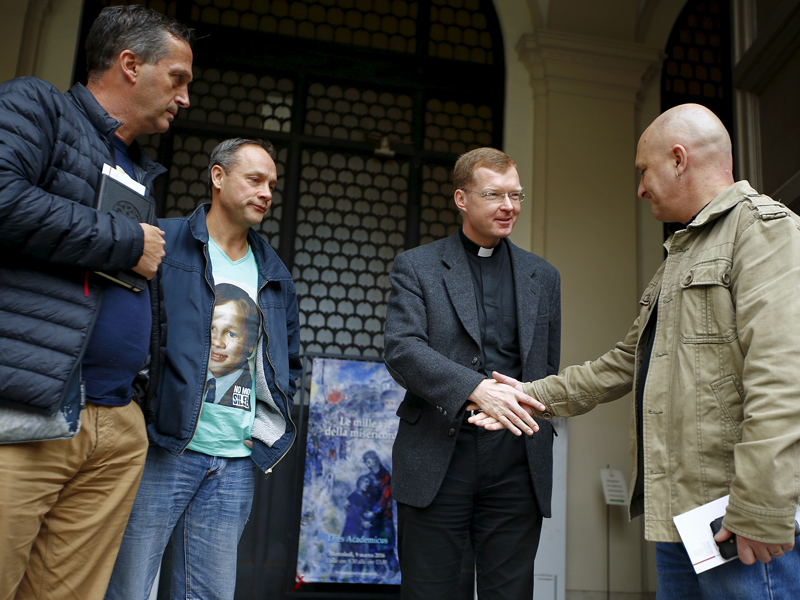
Father Hans Zollner, one of the founding members of the Pontifical Commission for the Protection of Minors, speaks during a press conference at the Foreign Press Association headquarters, in Rome, Thursday, Sept. 27, 2018. (AP Photo/Domenico Stinellis)
VATICAN CITY (RNS) — Those responsible for covering up abuse cases should be upfront and apologize, says a top Catholic expert on child protection and accountability. His comments come on the heels of a scathing report on sexual abuse in the Archdiocese of Munich, once headed by emeritus Pope Benedict XVI.
“Everybody who is in a position of responsibility makes mistakes, nobody’s perfect, but people would understand if you apologize to them,” said Jesuit Fr. Hans Zollner, a member of the Pontifical Commission for the Protection of Minors, created by Pope Francis in 2014 to combat abuse in the church.
The priest urged bishops and faithful to “do publicly what they do privately when they go to confession,” listing the steps necessary for the sacrament — examination of conscience, honest repentance, clear confession and the attempt for reparation.
“Then you can get forgiveness and absolution,” said Zollner, who is also president of the Safeguarding Institute at the Pontifical Gregorian University in Rome, in an interview with Religion News Service on Monday (Jan. 24).
A report of more than 1,000-pages looking into the cases of abuse in the Archdiocese of Munich-Freising and published on Thursday found that 497 people were abused by clergy members and Catholic laypeople between 1945 and 2019.
Three of the archbishops who oversaw the diocese during this period are still living, including Cardinal Joseph Ratzinger, who served as archbishop of Munich from 1977 to 1982 before becoming Pope Benedict XVI. The report found Ratzinger allowed four priests to continue their ministry in his diocese despite reports of abuse.
The emeritus pope signed a written response to legal questions published alongside the report, in which he expressed his closeness to the victims but denied any wrongdoing. While acknowledging the legal nature of Benedict’s response, Zollner, who has spent years instructing Catholic clergy and lay people in dioceses around the globe on how to adopt safeguarding measures, thinks more still needs to be done.
“I would have expected that beyond the response there should have been a greater acknowledgement of the suffering of the victims and there should have been much more empathy and humanity in this than just sticking to the letter of the law,” Zollner said.

Pope Emeritus Benedict XVI sits in St. Peter’s Basilica on Dec. 8, 2015. A long-awaited report on sexual abuse faulted his handling of four cases. (AP Photo/Gregorio Borgia)
Benedict’s 82-page response “misses the heart and misses the expectations of victims and their families, of the parishes and people in the pews and of the public,” he added.
In a message to Vatican reporters on Monday (Jan. 24), the personal secretary to Benedict, Mons. Georg Gänswein, said Benedict’s response was “incorrect” in stating Ratzinger was not present during a hearing in January of 1980 where the case of an abusive priest was addressed.
Benedict “is very sorry for this mistake and he apologizes for this mistake,” the message read, attributing the inconsistency to an editing error and stating the hearing did not address the pastoral assignment for the priest.
The emeritus pope is expected to release a comment on the report in the coming days, but in the meantime, he voiced his closeness to his former dioceses and its faithful as well as his “shame and pain at the suffering inflicted on the victims.”
For his part, Zollner feels there are portions of Benedict’s response “that are simply not consistent with Ratzinger’s other writings.” For example, he pointed to one section that suggests a priest accused of masturbating in front of a young girl did not constitute abuse since there was no touching.
“This is completely off,” Zollner said, pointing to the work done by Ratzinger when he headed the Vatican’s Congregation for Doctrine, which also oversees cases of clergy abuse in dioceses worldwide. The response was probably only signed by Ratzinger but written by a team of legal experts, he added, but that’s part of the problem.
“No good person wants Benedict’s great legacy — in theology, in the leadership of the church and in bringing about some changes in canon law regarding abuse — destroyed by this episode,” Zollner said.
“He can correct that impression, but only he, nobody for him,” he added.

Father Hans Zollner, second from right, greets Andrew Collins, right, David Ridsdale, left, and Peter Blenkiron, second left, who said they were child sex abuse victims, at the end of a meeting at the Gregoriana University in Rome, on March 3, 2016. Photo by Tony Gentile/Reuters
Zollner also addressed the allegations in the report that the current Archbishop of Munich, Cardinal Reinhard Marx, failed to enact safeguarding measures in two cases of abuse in 2008. Marx sent a resignation letter to Pope Francis in June of last year in light of the sex-abuse scandals rocking the church in Germany, but the pope refused his resignation.
“Yes, the situation is very difficult now,” Zollner said, “but you have to face it with all its consequences.” Apart from resignations, the child-protection expert said the church needs “concrete signs that show that the institution has learned something, be it the archdiocese, the German church or the church in general. People are looking for those signs, and they haven’t found them.”
RELATED: Germany: 125 queer Catholic Church employees demand respect
The Munich report came as no shock for Zollner, who has read countless similar ones in his efforts to promote safety and accountability in the church through the Safeguarding Institute.
“What is shocking is that all the archbishops from 1945 to date have mishandled cases, in different degrees, in different circumstances, but none of them — not a single one — did what we would consider today to be the right thing,” Zollner said.
Even with the staggering failures of the church hierarchies presented in the Munich report, Zollner welcomes such revelations, in that they represent “a step forward” for healing the past and doing better in the future as the church works to really implement recent prevention and accountability reforms.
“I see what has been going on for decades now as an exercise in humility for the church,” Zollner said. “If we are not humble within, we will be forced to be humble from the outside and the public.”
The church in Germany is going through what many churches in the world are experiencing, especially those that have commissioned such reports, which have brought to the fore the horrors of the past, Zollner said. In other dioceses in the world, it may take longer.
“More is going to be uncovered in the coming years and decades in other areas of the world, so brace yourselves,” Zollner said, “because either we change really, or it will continue in our lifetime without end.”
RELATED: Pope Benedict accused of mishandling sex abuse cases: 4 essential reads




